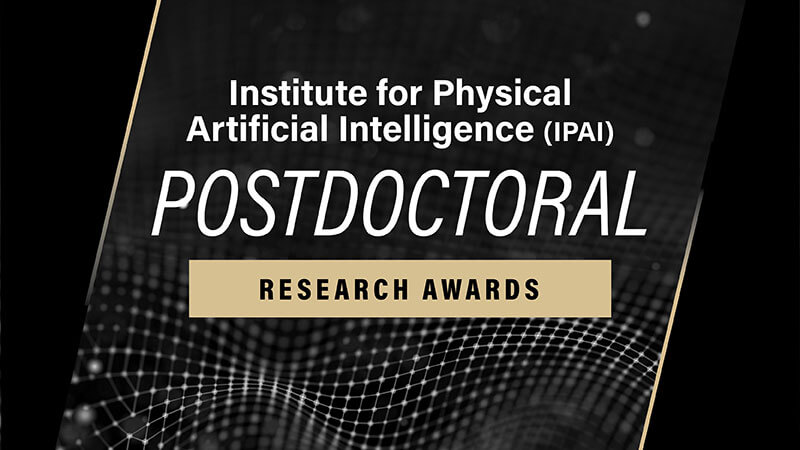Institute for Physical AI supports 7 postdoctoral researchers in projects in agriculture, autonomous vehicles, health care, drug development and manufacturing

The Institute for Physical Artificial Intelligence (IPAI) has awarded seven projects through its new postdoctoral research program, which is aimed at developing emerging leaders who address real-world problems in our physical environment. The awards support a postdoctoral researcher working under the supervision of two faculty advisors.
The projects were drawn from a competitive pool of over 50 proposals representative of fields of inquiry that span the university. The seven awarded projects include students and faculty from six colleges across campus and have applications in agriculture, autonomous vehicles, health care, drug development and manufacturing.
“The high quality and wide breadth of proposals we received is an indication of the interest and energy in physical AI on the Purdue campus,” said Karen Plaut, executive vice president for research. “We congratulate the award winners and look forward to following their research.”
Each of the projects awarded through the Institute for Physical Artificial Intelligence Postdoctoral Research program, funded through the Lilly Endowment and Purdue’s Office of Research, integrates AI/machine learning and another applied discipline. Of the 53 applications, nine were submitted by students, one of which was chosen for an award. The other applications were submitted by faculty who will use the award to hire a postdoc to pursue the work.
The projects chosen for awards are:
- “Advancing Safety in Autonomous Vehicles Through Variational Inference and Probabilistic Modeling,” which targets the enhancement of safety measures in autonomous vehicles by utilizing variational inference and probabilistic modeling to accurately predict and comprehend the uncertainties in vehicle trajectories. Advisors for this project are Ziran Wang, an assistant professor in the Lyles School of Civil Engineering in the College of Engineering, and Ruqi Zhang, an assistant professor in the Department of Computer Science in the College of Science.
- “VISTA: Vision Integration with Sensory Tactile Applications for Manufacturing Enhancement,” which aims to develop an innovative fused sensing system that enhances robotic precision and adaptability in manufacturing. The project will synthesize touch and vision into a single perception model, allowing for more complex and nuanced manipulation tasks as robots will gain a more sophisticated understanding of their environment. Project advisors are Yu She, an assistant professor in the School of Industrial Engineering in the College of Engineering, and Qiang Qiu, an assistant professor in the School of Electrical and Computer Engineering in the College of Engineering.
- “AI-driven Additive Manufacturing With Oxide Dispersion Strengthened Alloys for High Temperature Performance,” which aims to accelerate the current development of additive manufacturing (AM) of metal alloys driven by novel AI technologies. The project will develop an AI framework to rapidly analyze AM process data and design novel AM printing recipes by mapping AM parameters to AM material properties using a physics-knowledge embedded learning approach. Md Nasim, a graduate student in computer science, submitted the application for this project and will work with advisors Yexiang Xue, an assistant professor in the Department of Computer Science in the College of Science, and Xinghang Zhang, a professor in the School of Materials Engineering in the College of Engineering.
- “AI-Empowered Heterogeneously Nanomanufactured Imperceptible Human-Integrated Wearables for Personalized Digital Twins With Multimodal Fusion.” The long-term goal of this project is to innovate human health digital twins that can simulate, comprehend and predict the complex dynamic physiological and pathological states of a human counterpart in a personalized manner. The two-year project focuses on Parkinson’s disease and leverages encouraging progress in multimodal wearable sensors, advanced AI algorithms and established collaborations with clinicians to create digital twins that predict Parkinson’s progression and treatment outcomes. This advisors for this project are Wenzhuo Wu, an associate professor in the School of Industrial Engineering in the College of Engineering, and Guang Lin, a professor in the Department of Mathematics in the College of Science.
- “Decoding the Intergenic Regulatory Information in Crop Genomes to Enhance Genetic Improvement of Agricultural Traits,” which will test the hypothesis that the “informative” cis-regulatory motifs buried in the intergenic non-coding region of crop genomes could be discerned by a large language model and then genome-edited to alter transcriptional control of genes to improve agriculturally important traits. This advisors for this project are Ying Li, an associate professor in the Department of Horticulture and Landscape Architecture in the College of Agriculture, and Jing Gao, an associate professor in the Elmore Family School of Electrical and Computer Engineering in the College of Engineering.
- “Equitable and Personalized Treatment of Edema Through Wearable Textiles and Machine Learning-Based Pain Assessment,” which will develop a new treatment method for peripheral edema, a prevalent medical condition that requires a high degree of personalization to effectively mobilize fluid from affected bodily locations. The project will explore textile-based wearable systems that offer a personalized device that fits the unique body contours, real-time pain detection through machine learning, remote monitoring and just-in-time intervention. Project advisors are Liang He, an assistant professor in the Department of Computer Graphics Technology in the Purdue Polytechnic Institute, and Sooyeon Jeong, an assistant professor in the Department of Computer Science in the College of Science.
- “Combining Structure-Based Computational Modeling With Machine Learning to Guide the Design of Advanced Biologic Therapies,” which will use machine learning to enhance the accuracy of fast, coarse-grained computer models (in which atoms are grouped together to enhance computational speed) in an effort to improve the speed and accuracy of computational tools for advancing the delivery and formulation of new biologic therapies. Project advisors are Arezoo Ardekani, a professor in the School of Mechanical Engineering in the College of Engineering, and Severin T. Schneebeli, an associate professor in the Department of Industrial and Molecular Pharmaceutics in the College of Pharmacy.